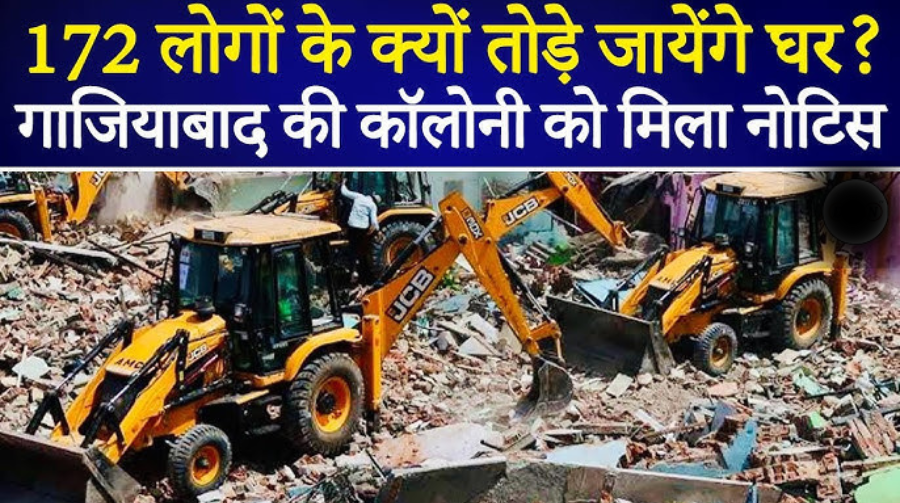News
Ghaziabad Colony Receives Demolition Notice: 172 Houses to Be Razed Within 15 Days
In a shocking development, authorities in Ghaziabad have issued a demolition notice to a local colony, ordering that 172 houses be torn down within 15 days.
This move has thrown hundreds of families into uncertainty, raising questions about housing rights, urban planning, and governance.
Why the Demolition Notice Was Issued
According to Ghaziabad Development Authority (GDA) officials, the colony was built on unauthorized land, violating zoning and environmental laws.
The key reasons behind the decision include:

- Encroachment on land designated for public infrastructure and green zones.
- Absence of required building approvals and occupancy certificates.
- Safety risks posed by haphazard construction in flood-prone or environmentally sensitive areas.
Details of the Affected Colony
The colony in question is located near Raj Nagar Extension, a rapidly developing area in Ghaziabad known for its affordable housing projects.
Approximately 172 houses, many of which have been occupied for years, have been declared illegal. Several families claimed they had purchased these houses in good faith, unaware of legal violations by builders and developers.
Legal Status and Unauthorized Constructions
Unauthorized colonies are a major challenge in NCR cities, including Ghaziabad. Builders often develop plots without adhering to municipal guidelines, and unsuspecting buyers fall into the trap.
Key legal issues include:
- Lack of approved layout plans.
- Non-payment of development charges to the authorities.
- Absence of proper drainage, sewage, and fire safety systems.
Officials argue that these demolitions are necessary to enforce urban planning norms and prevent future illegal settlements.
Residents’ Reactions and Emotional Turmoil
The notice has sparked widespread fear and anger among residents:
- Many have invested their life savings into these homes.
- Families with elderly members and children are particularly worried about immediate displacement.
- Several residents staged protests outside the GDA office, demanding a stay on demolitions.
Emotional statements like “Where will we go with our children in just 15 days?” reflect the deep distress caused by this sudden action.
Government and Municipal Corporation’s Stand
The Ghaziabad Development Authority maintains that:
- Residents were repeatedly warned about the colony’s illegal status.
- Multiple notices had been served over the past few years, but no corrective measures were taken.
- Strict action is essential to maintain law and order and reclaim public land.
The administration has offered assistance in finding temporary shelters, but residents argue that these solutions are inadequate.
Humanitarian and Social Impact
Beyond legalities, this demolition will deeply affect:
- Children’s education, as many might be forced to leave schools mid-session.
- Livelihoods, with home-based businesses and workers facing immediate disruption.
- Community bonds, as families built over years will be broken overnight.
Human rights activists have criticized the lack of a comprehensive rehabilitation plan, urging authorities to focus on inclusive urban development.
Possible Legal Remedies for Homeowners
Experts suggest residents can:
- Approach the High Court for a stay order against demolition.
- File collective Public Interest Litigations (PILs) highlighting builder fraud and administrative negligence.
- Seek compensation from builders under consumer protection laws.
Lawyers advise affected families to collect all purchase-related documents and maintain records of payments and communications with builders.
The Future of Urban Encroachments in Ghaziabad
This incident serves as a warning about the dangers of unauthorized colonies:
- Buyers must verify land titles, approvals, and municipal clearances before purchasing properties.
- Authorities are likely to increase crackdowns on illegal constructions to streamline urban planning.
At a broader level, it signals the urgent need for transparent, builder-accountable housing policies in fast-growing cities like Ghaziabad.
Conclusion
The demolition notice to 172 houses in Ghaziabad highlights the fragile balance between urban growth and law enforcement.
While unauthorized constructions cannot be ignored, sudden large-scale demolitions without robust rehabilitation plans leave innocent families vulnerable and homeless.
This situation calls for a compassionate yet firm approach, holding fraudulent builders accountable while protecting common citizens from becoming collateral damage in development battles.